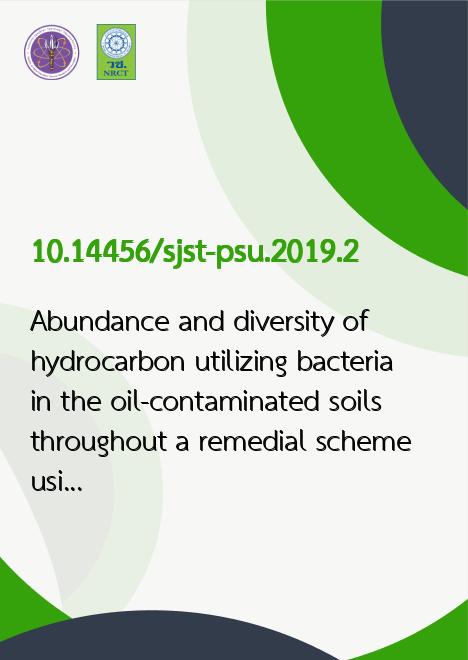
|
Abundance and diversity of hydrocarbon utilizing bacteria in the oil-contaminated soils throughout a remedial scheme using compost amendment |
|---|---|
| รหัสดีโอไอ | |
| Creator | 1. Saowalak Naowasarn 2. Suchat Leungprasert |
| Title | Abundance and diversity of hydrocarbon utilizing bacteria in the oil-contaminated soils throughout a remedial scheme using compost amendment |
| Publisher | Research and Development Office, Prince of Songkla University |
| Publication Year | 2562 |
| Journal Title | Songklanakarin Journal of Science and Technology |
| Journal Vol. | 41 |
| Journal No. | 1 |
| Page no. | 12-20 |
| Keyword | hydrocarbon utilizing bacteria, PCR-DGGE, contaminated soil, used lubricating oil |
| URL Website | http://rdo.psu.ac.th/sjstweb/index.php |
| ISSN | 0125-3395 |
| Abstract | Since hydrocarbon utilizing bacteria (HUB) play a role in the biodegradation of hydrocarbons in oil-contaminated soil, the abundance and diversity of HUB over the course of soil remediation is indicative of the hydrocarbon bioremediation performance. This research experimented with uncontaminated soil, 5% (w/w) oil-contaminated soil (with no compost amendment), and 5% (w/w) oil-contaminated soil amended with chicken manure compost. The entire experiment lasted 84 days. The findings indicated that the introduction of chicken manure compost into the soils increased the abundance and diversity of the bacterial communities and thereby the biodegradation performance. The higher numbers of microbes in the compost-amended soil relative to the non-amended soils could be attributed to the nutrients in the compost, which promoted the bacterial growth. The experimental results are expected to provide useful insights for further study and the application of poultry waste to the bioremediation of petroleum-contaminated soils. |
